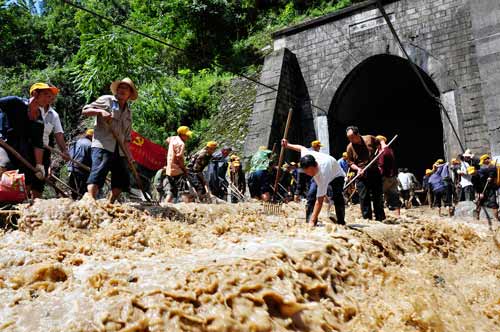|
 |
|
RECOVERING FROM THE RAIN: Workers clear debris from a tunnel on the Xiangfan-Chongqing Railway. The railway resumed operation on July 20 after a strong storm hit a section of the route near Dazhou, Sichuan Province (TANG ZHENJIANG) |
By August 4, more than 140 people had been reported dead or missing in the province due to floods and landslides. In addition, 333 enterprises across the province suffered equipment damages or plant collapses due to rainstorms, leading to a combined economic loss of around 3.14 billion yuan ($463.1 million), reported Xinhua News Agency.
The China Jilin Forest Industry Group was severely hit as a storm smashed its forestland and destroyed vast swathes of plant nurseries, with direct economic losses amounting to nearly 2 billion yuan ($295 million). The company is taking vigorous efforts to recover the lost ground.
As part of its relief efforts, the provincial government has pledged a handful of policy incentives such as favorable loans to affected companies in a move to help them resume production as soon as possible.
Further impact
With the nationwide storms disrupting agriculture and jacking up food prices, fears are rising about inflation.
Pork prices nationwide have been on the rise for seven consecutive weeks since early June due to the raging storms, said the National Development and Reform Commission.
In the last week of July, 48 of the 60 monitored consumer products in Henan Province, such as vegetables, pork and fruits, witnessed increases in price. Egg prices, in particular, surged 27 percent to hit a six-year record high, said the Commerce Department of Henan Province.
The summer rain is putting a dent on agriculture, as well as product logistics, therefore chalking up prices, said Liu Chengzhuang, a senior official of the department.
Such a wide range of price increases is unusual in history and may be an indicator of inflation, he added.
But Zhuang Jian, chief economist at the Asian Development Bank, China Representative Office, dismissed these worries. The disaster is pushing up food prices in the short-term, but serious inflation is less likely, he said.
Lu Zhengwei, a senior economist with the Industrial Bank Co. Ltd., agreed. "The disaster-stricken areas only account for a minority of China's grain producers and are expected to have a limited impact on the country's food supply," he said.
In addition, the government has rich reserves of grain, including rice, wheat and corn, and is capable of keeping food prices under control, he said.
| 